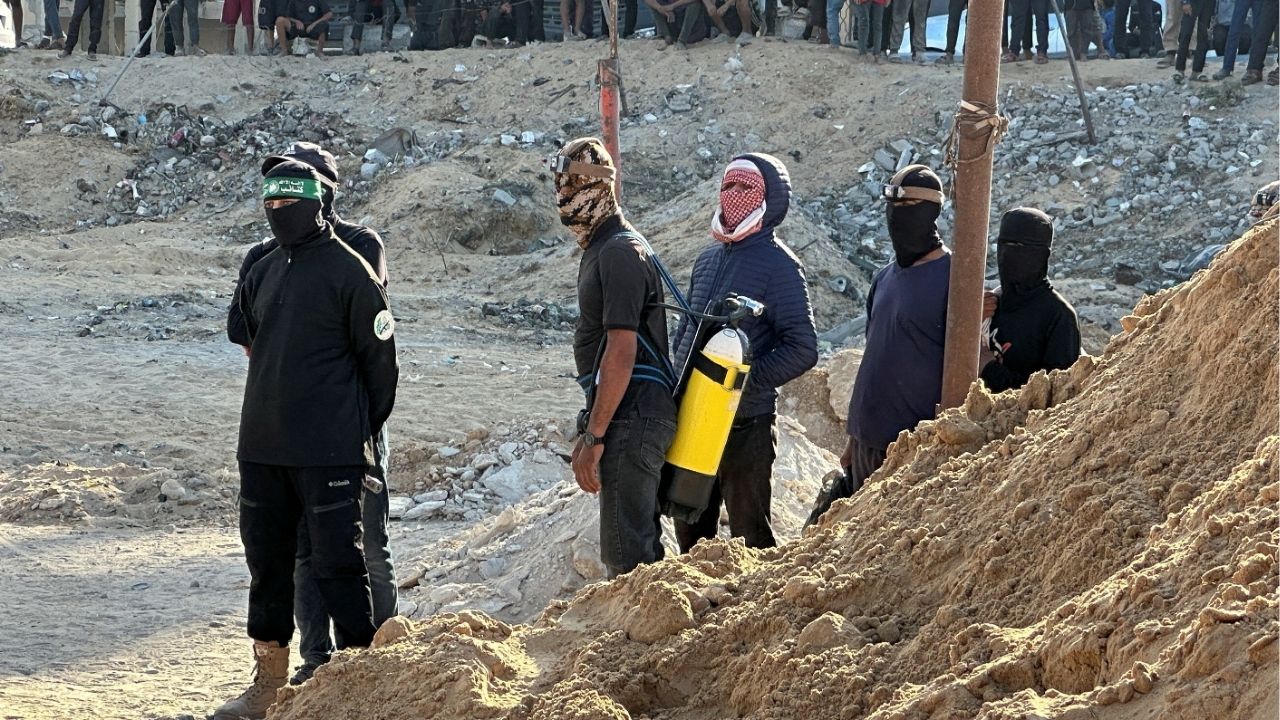Politics
Israeli Airstrikes Target Gaza Following Ceasefire Violations

Israeli airstrikes in Gaza on Tuesday resulted in the deaths of at least eight individuals, marking a significant escalation in violence amid a fragile ceasefire. The strikes were conducted after Israeli officials accused the militant group Hamas of breaching the ceasefire agreement, which had been brokered by U.S. President Donald Trump earlier this month.
The fatalities included three people in Gaza City’s Sabra neighborhood and five others in a vehicle targeted in Khan Younis, according to local health authorities. The Israeli military has yet to comment on the airstrikes, which come after Prime Minister Benjamin Netanyahu ordered “powerful attacks” in response to perceived violations of the ceasefire.
Israeli military officials have stated that the ceasefire was compromised by an attack from Hamas against Israeli forces in an area under Israeli control. “This is yet another blatant violation of the ceasefire,” an Israeli military official said, emphasizing the ongoing tension between the two sides.
Ceasefire Agreement Under Strain
The U.S.-backed ceasefire, which took effect on October 10, 2023, was intended to halt two years of conflict that escalated following Hamas-led attacks on Israel on October 7, 2023. Both parties have exchanged accusations of violating the terms of this agreement. U.S. Vice President JD Vance, who recently visited Israel, remarked that “the ceasefire is holding” despite the recent episodes of violence. He acknowledged the possibility of minor skirmishes, maintaining optimism regarding the longevity of the peace initiative.
Earlier in the day, Israeli media reported an exchange of fire between Israeli forces and Hamas fighters in Rafah, a city in southern Gaza. Hamas denied any involvement in the reported attack on Israeli soldiers. The group asserted its commitment to the ceasefire, even as tensions remain high.
Tuesday’s airstrikes followed a previous “targeted strike” on Saturday, aimed at an individual in central Gaza allegedly planning an attack against Israeli troops. Netanyahu has also accused Hamas of breaching the ceasefire during the ongoing process of returning hostages to Israel.
Hostage Negotiations Complicated by Violence
In a further complication, Netanyahu alleged that Hamas had returned incorrect remains in the process of transferring hostages back to Israel. He claimed the remains provided on Monday belonged to Ofir Tzarfati, an Israeli killed during the October 7 attacks, and that these remains had already been partially recovered by Israeli forces.
Hamas had initially indicated it would hand over the body of a missing hostage found in a tunnel in Gaza. However, the armed wing of Hamas, known as the Al-Qassam Brigades, later announced a postponement of the handover, citing Israel’s violations of the ceasefire as the reason for the delay. Hamas accused Netanyahu of seeking excuses to evade Israel’s obligations under the ceasefire agreement.
Under the terms of the ceasefire, Hamas was to release all living hostages in exchange for nearly $2,000 Palestinian prisoners and wartime detainees. Additionally, Hamas agreed to return the remains of deceased hostages yet to be recovered, but has indicated that locating these bodies within Gaza’s ruins may take time. Israeli officials contend that Hamas has access to the remains of most of the hostages.
The ongoing search for the bodies of hostages intensified in recent days, aided by heavy machinery that arrived from Egypt. Reports indicate that bulldozers were active in Khan Younis and Nuseirat, with Hamas fighters reportedly providing security for the excavations. Witnesses noted that Egyptian teams, working alongside Hamas, were digging near Qatari-funded housing in Khan Younis, aiming to reach tunnel shafts that may contain the remains of hostages.
According to Gaza health authorities, the conflict has resulted in at least 68,000 confirmed deaths due to Israeli strikes, with thousands more reported missing. This war began after Hamas fighters breached southern Israel, resulting in the deaths of approximately 1,200 people and the abduction of 251 hostages.
The situation remains fluid, with the ongoing violence posing serious challenges to the fragile ceasefire and peace endeavors in the region.
-

 Science2 weeks ago
Science2 weeks agoResearchers Challenge 200-Year-Old Physics Principle with Atomic Engines
-

 Politics2 weeks ago
Politics2 weeks agoNHP Foundation Secures Land for 158 Affordable Apartments in Denver
-

 World4 days ago
World4 days agoBoeing’s Aircraft Production: Assessing Numbers and Challenges
-

 Entertainment3 days ago
Entertainment3 days agoSyracuse Stage Delivers Lively Adaptation of ‘The 39 Steps’
-

 Health2 weeks ago
Health2 weeks agoNeuroscientist Advocates for Flag Football Until Age 14
-

 Lifestyle2 weeks ago
Lifestyle2 weeks agoLongtime Friends Face Heartbreak After Loss and Isolation
-

 Science3 days ago
Science3 days agoAI Misidentifies Doritos Bag as Gun, Triggers Police Response
-

 Lifestyle4 days ago
Lifestyle4 days agoRed Bluff High School’s Elli Nolan Named Rotary Student of the Month
-

 Top Stories4 days ago
Top Stories4 days agoUrgent Search for Suspect Who Exposed Himself to Teen Girl
-

 Business2 weeks ago
Business2 weeks agoSpirit Airlines Cuts Workforce with Furloughs for 365 Pilots
-

 World2 weeks ago
World2 weeks agoGlobal Military Spending: Air Forces Ranked by Budget and Capability
-

 Health2 weeks ago
Health2 weeks agoFDA Launches Fast-Track Review for Nine Innovative Therapies









